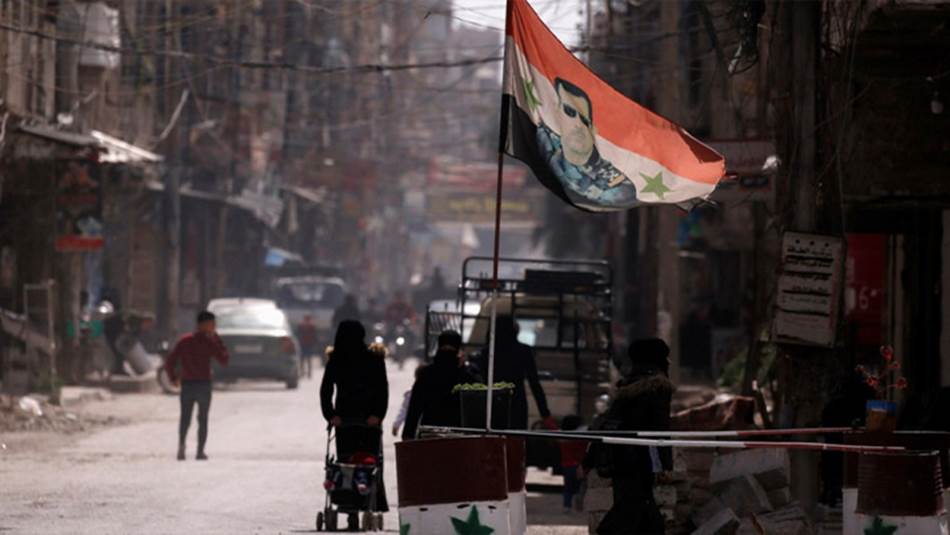Since the United Nations announced in March its intention to launch a “Early Recovery Trust Fund” in Syria this summer, and talk of Gulf donors intending to fund it, the issue has become a major topic of discussion by Syrian activists, fearing that it would lead to an economic breakthrough in favor of the regime, without any political cost. At the same time, there is no denying the urgent need to move support for Syrians from emergency humanitarian response to building self-sustainable capacities for survival. This prompts a search for ways to regulate this process in a way that achieves the goal of this intervention.
One attempt to research this area is a study released earlier this year by The Day After, a Syrian non-governmental organization established in 2012 that works to support the democratic transition in Syria. The study is titled: “The Impact of Early Recovery and Reconstruction Projects on Housing, Land and Property Rights in Syria.” The study warns that neglecting these rights leads to the exclusion of marginalized and disadvantaged groups. It is therefore essential to know the level of inclusion of these rights in early recovery and reconstruction projects in Syria.
The study identified seven types of projects that fall within the procedural definition of early recovery and reconstruction in Syria. To identify these types of projects, the study utilized internationally funded projects implemented for the benefit of Syrians, including: Rehabilitating infrastructure, repairing and rebuilding damaged residential buildings, building new residential communities, supporting health services, supporting educational services, supporting private business and job creation, and supporting social cohesion projects.
The study shows that after long periods of conflict, according to specialized literature, many houses are denied rehabilitation and restoration because their owners are unable to prove their ownership as a result of the loss of identification documents and the transfer of ownership during the conflict without registering it, or the process is reversed and houses inhabited by non-owners are rehabilitated as a result of displacement and seizure of property. This contributes to the promotion of housing rights for the disenfranchised. These are examples that apply extensively to the Syrian case since 2012.
Through a historical background of how the regime dealt with property and housing rights under Hafez al-Assad and the activation of the Emergency Law and its Article 4, which includes the ability of the martial law governor to issue orders to seize any property, whether registered or unregistered, the study shows how housing, land and property rights under Assad Sr. became a commodity to negotiate with and control society in order to serve his ability to remain in power.
This was repeated on a larger scale, and more severely, after 2011. In this context, the study details the arsenal of laws issued by Bashar al-Assad after the revolution that violate property, land, and housing rights. There are at least nine decrees and laws that allow regime authorities to seize the property of displaced persons, refugees, and dissidents. This is in addition to a number of administrative decisions, most notably the need to obtain prior security approval for the sale, inheritance, and transfer of property, and the requirement to obtain prior security approval for the issuance of a judicial agency to manage the property of absent or missing persons, which means restricting the ability of displaced persons, refugees, and even relatives of missing and absent persons to dispose of their property and the property of their relatives, whether by sale or investment.
The study proposes a number of measures to limit the regime’s ability to intervene, including identifying targeting areas according to needs and verifying ownership status, and adopting verification of non-violation of housing, land, and property rights as a prerequisite for funding. Donors asked international organizations to be more aggressive in negotiating with government agencies affiliated with the regime, rather than directly acquiescing to their demands, taking advantage of the regime’s urgent need to respond due to the excessive pressure of the living crisis in the areas under its control. In addition to providing technical and financial support to train Syrian specialists to monitor property rights violations, the training should be conducted via virtual space to ensure the safety of the trainees.
In conclusion, if the scope of “early recovery” projects must be expanded to approach the margin of “reconstruction” to alleviate the unprecedented deterioration of living conditions in regime-controlled areas and other areas, this should not mean giving the regime the ability to control and direct these projects to serve those close to it at the expense of those who are actually affected, because this would mean establishing a new societal explosion in a short period of time, as more than one specialized study in the field of conflict management predicts.
This article was translated and edited by The Syrian Observer. The Syrian Observer has not verified the content of this story. Responsibility for the information and views set out in this article lies entirely with the author.


